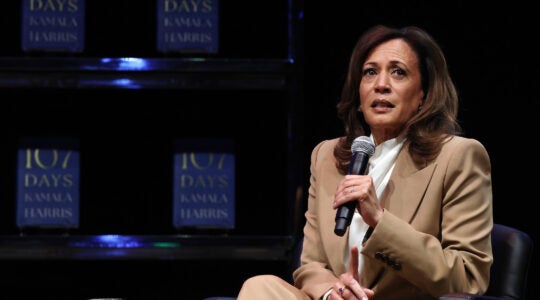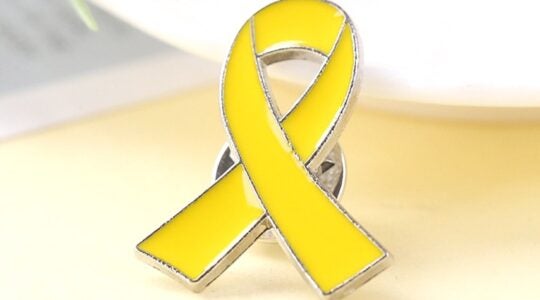The Forward has a major story and editorial focusing on gender discrepancies in the Jewish organizational workplace (just in case that’s doesn’t make clear how seriously the newspaper is taking the issue, editor Jane Eisner co-wrote the news article, which also comes with a helpful chart):
Despite notable gains for women in the past year, a Forward survey of 75 major American Jewish communal organizations found that fewer than one in six are run by women, and those women are paid 61 cents to every dollar earned by male leaders.
The numbers are especially striking when compared with the overall composition of the Jewish communal work force. Women comprise about 75% of those employed by federations, advocacy and social service organizations, and religious and educational institutions, but occupy only 14.3% of the top positions. Of the 11 female leaders identified in this survey, three are in interim roles.
Looking at the numbers of women in the ranks of chief executives, it is hard to argue when the Forward concludes that the community "clearly has work to do":
Had the Forward’s survey of women leaders in major communal organizations been conducted just two years ago, the results would have been even more dismal. Clearly some of the bastions of power once monopolized by men — particularly in federation and religious life — are beginning to open up to women, who often bring with them new perspectives, energy and leadership styles. Many more women are chairing important, policy-making nonprofit boards. Foundations are beginning to invest in educating and mentoring young women and men. Rabbinical schools are ordaining record numbers of women, who already are having a profound effect on Jewish ritual and spiritual practices.
Sybil Sanchez, the first woman to lead the Jewish Labor Committee, credits the Muehlstein Institute for Jewish Professional Leadership for preparing her for her new role and strengthening her Jewish commitment. Other women can point to similarly productive training and mentoring experiences.
Still, the numbers speak for themselves. With women holding only 14.3% of the top jobs in the 75 organizations surveyed by the Forward, and with salaries for women lagging far behind those for men, the community clearly has work to do.
But the Forward is on shakier ground when it gives equal emphasis in its lead sentence to the claim that women in top spots are paid " 61 cents to every dollar earned by male leaders."
The problem with the claim about unequal pay is that it’s a case of comparing apples and oranges — no two top jobs are exactly the same, so who’s to say the salaries should be? For example, of the largest 18 federations, only San Francisco has a woman chief executive: Jennifer Gorovitz, who became acting CEO after Daniel Sokatch left to head up the New Israel Fund. According to the Forward’s handy chart, Gorovitz is making $305,000 — putting her at 13th on the list. The average salary of the 17 males on the list is $395,365.
According to the Forward’s logic, Jewish federations don’t give equal pay because Gorovitz earns 77% of what her male colleagues make on average. But this line of argument ignores a bunch of factors: size of budget, size of staff, seniority, Gorovitz’s interim status, etc. Perhaps the better question would be: Are Jewish women in the top spots getting paid better than their predecessors.
In Gorovitz’s case, she makes $305,000; according to the most recently available tax forms, the post paid $320,000 in 2007. Throw in the economic downturn, drop in fund raising and Gorovitz’s interim status, and it seems hard to argues that she’s getting a raw deal (assuming Sokatch didn’t make a ton more in 2008).
The Forward article eventually gets around to acknowledging the point — "salary comparisons can be imprecise because no two jobs are truly alike; the size of organizations and the length of service are factors that boards consider when setting compensation for top executives" — but quickly gets back on message, insisting that "these comparisons can serve as a useful window into the level of equal pay and opportunity in the workplace and are a good measure of change over time."
All that said, even if think the evdience is shaky when it comes to the claim about unequal pay, that doesn’t take away from the fact that there seems to be a major hiring discrepancy. Bottom line: There are as many Jewish lawmakers in the Iranian parliament as there are women in the stable of CEOs at top Jewish federations.
Plus, according to the Forward’s editorial, where there is more helpful data on salaries — lower down on the Totem pole — it does appear women are getting the shaft:
Moreover, women seem to lag behind even in the same jobs. A just-published study by Bruce Phillips, professor of Jewish Communal Service at Hebrew Union College-Jewish Institute of Religion, found “a significant difference exists between the income earned by men and women working in Jewish communal service.” But, he said, that is not because women are working in lower-paying settings, and it is not because men are more experienced in their jobs.
UPDATE: The Forward editorial has a line essentially anticipating (and attempting to shoot down) my criticism. I’m not convinced, but you decide: "The argument that women earn less because they run smaller organizations is a self-fulfilling prophecy if they are barred by custom or prejudice from competing for the high-paying jobs in the federation and national advocacy world."
JTA has documented Jewish history in real-time for over a century. Keep our journalism strong by joining us in supporting independent, award-winning reporting.





